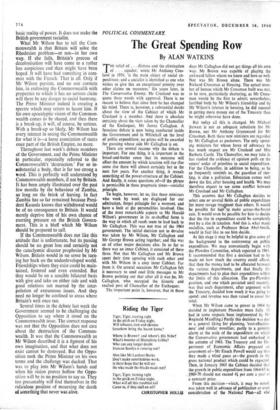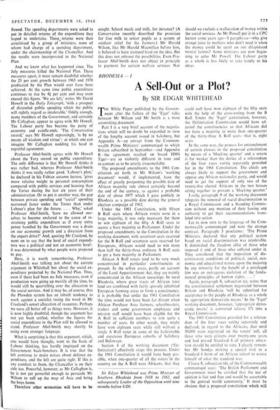The Great Spending Row
POLITICAL COMMENTARY,
By ALAN WATKINS
HE relief of . . . distress and the elimination of . . . squalor,' wrote Mr Anthony Cros- land in 1956, 'is the main object of social ex- penditure; and a socialist is identified as one who wishes to give this an exceptional priority over other claims on resources.' Six years later, in The Conservative Enemy, Mr Crosland was to quote these words with approval. There is no reason to believe that since then he has changed his mind. There is, however, a substantial doubt about the view of the Cabinet of which Mr Crosland is a member. And there is absolute certainty about the view taken by the Chancellor of the Exchequer, Mr James Callaghan. A ferocious debate is now being conducted inside the Government and in Whitehall on the level of public expenditure; no prizes will be awarded for guessing whose side Mr Callaghan is on.
There are several reasons why the debate is important. For one thing, it is important in the bread-and-butter sense that its outcome will affect the amount by which taxation will rise (for some rise there will almost certainly be) in the next few years. For another thing, it reveals something of the power-structure of the Cabinet. And finally, it raises questions of—if the phrase is permissible in these pragmatic times—socialist principle. • To begin, however, let us, like those ministers who week by week are displayed for our admiration, forget principle for a moment, and have a look at the personalities involved. One of the most remarkable aspects to Mr Harold. Wilson's government in its re-shuffied form is the way in which all roads seem to lead back to Mr Callaghan. This was not true of the 1964 government. The initial decision not to devalue was taken by Mr Wilson, Mr Callaghan and Mr George Brown acting together; and this was so of other major decisions also. In so far as there was an inner Cabinet, it consisted of these three. Not that Mr Callaghan and Mr Brown spent their time agreeing with each other and with Mr Wilson in a cosy inner Cabinet. Far from it. On several occasions Mr Callaghan felt it necessary to send cool little messages to Mr Brown pointing out that after all it was he, Mr Callaghan, who occupied the historic and exalted post of Chancellor of the Exchequer.
The important point is, however, that in those days Mr Callaghan did not get things all his own way. Mr Brown was capable of playing the awkward fellow whom we know and love so well. Nor was Mr Brown alone. There was Mr Richard Crossman at Housing. The actual num- ber of houses which Mr Crossman built was not, to be sure, particularly shattering, as Mr Cross- man would be the first to admit; nevertheless, fortified both by Mr Wilson's friendship and by Mr Wilson's interest in housing, he did succeed in getting more money out of the Treasury than he might otherwise have done.
But today all this is changed. Mr Michael Stewart is not an adequate substitute for Mr Brown, nor Mr Anthony Greenwood for Mr Crossman. Both these new ministers are regarded by Mr Callaghan as pushovers. The only spend- ing ministers for whose force of advocacy he has much respect are Mr Crosland and Mrs Barbara Castle. The Chancellor, we may take it, has studied the evidence of opinion polls on the voters' order of priorities in social expenditure. For the Chancellor, in addition to being, as he so frequently reminds us, the guardian of ster- ling, is also a politician. Education comes well down the list, after housing and health. We may therefore expect to see some conflict between Mr Crosland and Mr Callaghan.
This assumes that Mr Callaghan decides to select one or several fields of public expenditure for more savage treaent than others. It would be possible for to. make across-the-board cuts. It would even be'possible for him to decide that the rise in expenditure could be completely . met by a rise in taxation. And this is what many socialists, such as Professor Brian Abel-Smith, would in fact like to see him decide.
At this stage it may be helpful to give some of the background to the controversy on public expenditure. We may conveniently begin with _ the Plowden Committee, which reported in 1961. It recommended that first a decision had to be made on how much the country could afford, that then the money had to be allocated between the various departments, and that finally the departments had to plan their expenditure within the limits of this allocation. The pre-Plowden position, and one which persisted until recently, was that each department, after argument with the Treasury, decided how much it was going to spend; and revenue was then raised to cover the total.
When Mr Wilson came to power in 1964 he decided, to implement Plowden more fully. (It had in some respects been implemented by Mr -Reginald Maudling.) Partly this decision was due to a general liking for planning, 'cost-effective- ness' and similar novelties; partly to a genuine alarm at the scale of the expenditure on which the Conservative government had embarked in the autumn of 1963. The Treasury and the De- partment of Economic Affairs prepared an assessment of—Mr Enoch Powell would say that they made a blind guess at—the growth in the gross national product which could be expected. Then, in January 1965 the Cabinet decided tha- the growth in public expenditure from 1964-65 1969-70 should not exceed 4-1 per cent a year a' a constant price.
From this decision—which, it may be noted, was taken well in advance of publication or even consideration of the National Plan—alt else
flowed. The spending departments were asked to put in detailed returns of the expenditure they hoped to undertake. These. returns were then scrutinised by a group of ministers, none of whom had charge of a spending department, under the chairmanship of the Chancellor. And the results were incorporated in the National Plan.
And we know what has happened since. The July measures killed the National Plan. These measures apart, it must remain doubtful whether the 25 per cent growth between 1965 and 1970 predicated by the Plan would ever have been achieved. At the same time public expenditure continues to rise by 4} per cent and may even exceed this figure. 'We are left,' writes Mr David
Howell in the Daily Telegraph, 'with a prospect
of distended public spending which the public will rightly regard as intolerable.' Oddly enough, many members of the Government, and certainly Mr Callaghan, appear to agree with Mr Howell. The Labour party has become the party of economy and candle-ends. 'The Conservative record,' says Mr Howell reprovingly, 'is by no means all wisdom and virtue': at which one can imagine Mr Callaghan nodding his head in regretful agreement.
Professor Abel-Smith agrees with Mr Howell about the Tory record on public expenditure.
The only difference is that Mr Howell thinks it was rather bad, whereas Professor Abel-Smith thinks it was really rather good. 'Labour's plan,' he declared in his Fabian autumn lecture, 'gives more relative weight to personal consumption compared with public services and housing than the Tories during the last six years of their administration. Or to put it another way, the gap between private spending and "social" spending narrowed faster under the Tories than under Labour's plan for the future. . . . Why,' asked Professor Abel-Smith, 'have we allowed our- selves to become enslaved to the cause of re- straining public expenditure as if every extra penny handled by the Government was a drain on our economic growth and a diversion from the export drive?' And, quoting Mr Crosland, he went on to say that the level of social expendi- ture was a political and not an economic level: it was determined by what people were prepared to pay.
Here, it is worth remembering, Professor Abel-Smith was talking not about the current argument in Whitehall but about the social ex- penditure projected by the National Plan. Thus, even if there had been no July measures, even if production were going up merrily all the time, he would still be quarrelling over the allocation to the social services. And it may be, of course, that the Plowden system has an inbuilt tendency to work against a socialist (using the word in Mr Crosland's sense) allocation of resources. Perhaps
we were all better off as things were. However, it
is now highly doubtful, though the argument has not yet been settled, whether the figures for social expenditure in the Plan will be allowed to stand. Professor Abel-Smith may shortly be using even stronger language.
What is surprising is that this argument, which, one would have thought, went to the basis of Labour thinking, has hardly impinged on the Government back-benchers. It is true that the left continue to make noises about defence ex- penditure, and the left are quite right. If this is any comfort to them, the Chancellor is on their side too. Powerful, however, as Mr Callaghan is, he is not yet powerful enough to persuade Mr Wilson to roll up the map of Asia and bring the boys home.
Therefore other economies will have to be sought. School meals and milk, for instance? (A Conservative recently described the provision for free milk to senior pupils as a system of outdoor relief for the farmers.) Mr Harold Wilson, like Mr Harold Macmillan before him, is believed to have stamped hard on the idea. But this does not exhaust the possibilities. Even Pro- fessor Abel-Smith does not object in principle to payment for certain welfare services. Nor should we exclude a reallocation of money within the social services. As Mr Powell put it in a CPC lecture some years ago—I paraphrase—why give orange juice to mothers who don't need it when the money could be spent on our dilapidated mental homes? Some ministers are now begin- ning to echo Mr Powell. The Labour party as a whole is less likely to take kindly to his ideas.































 Previous page
Previous page